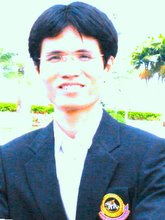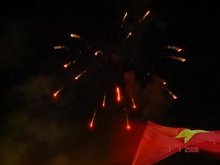Essay for the ASEF University in Macau, December 2008.
I would like to share you guys the essay that I have written to submit for the ASEF Universities Symposium Scholarship this December.
The Metropolis in Asia and Europe
SUSTAINABLE TOURISM TOWARDS URBANIZATION IN HANOI CITY.
Hanoi is a holy name to many Vietnamese people, the second largest city in Vietnam, an ancient city with a long-standing culture and history and famous landscapes. Even though I was not born in Hanoi, I was raised there. There are many authors and musicians writing about the unique and ancient charms of Hanoi with the coming 1000th year anniversary of the founding of the city.
I studied for an undergraduate degree at Hanoi University majoring in Language Arts, which helped me have some chances to study history and culture about this city, and then I continued to study in Tourism Management in Thailand. These two different fields helped me to widen my eyes and deepen my thinking about the metropolitan cities in Asia and Europe with hands-on experiences. My field of study has helped me to gain an in-depth understanding about the terms such as Sustainable Tourism Development, Economic Globalization, Cultural Heritage and Urban Planning throughout the world. In addition, I possess the basic knowledge of my original country in line with studying about world tourism and development. I hope to be involved in the urban policy planning towards the master plan for the year 2015 for my country. I would like to envision the Hanoi City of the future.
Hanoi’s economic development and urban planning are in line with sustainable tourism, because Hanoi has been the largest tourist center of the whole country, the image of a country with a population of nearly 90 million people. This city plays a very important and meaningful role for Vietnam and can be a showcase for sustainable tourism with industrialization and modernization. Our Capital City can stand in line with other world-class cities. Globalization has pushed Hanoi to grow very fast, however, it necessarily deals with environmental problems, takes measures to make full use of historical and cultural vestiges.
In the national development strategies pointed out the key economic player is tourism towards sustainable development such as professional orientation of tourism development, territorial orientation of tourism development and investment orientation of tourism development.
The goal in many fields of Vietnam economics is to turn Vietnam into an internationally accepted market; nationally owned and non-government enterprises can be involved in developing a global perspective.
The territorial orientation of developing tourist sites or attractions in Hanoi Capital City, Vietnam should be concerned with the urban planning policies. As such, the socio-economic development must be viewed in connection with surrounding areas in the region for sustainable development.
The urban planning must make unique products and services including location for the political, cultural, educational, commercial and financial center, as well as transportation, sport centers, entertainment areas, telecommunication and control centers of tourism throughout the country. Development means linking to economic-cultural heritage where the social structure and urban planning go in harmony with the urban economy and ecology.
SUSTAINABLE TOURISM TOWARDS URBANIZATION IN HANOI CITY.
Hanoi is a holy name to many Vietnamese people, the second largest city in Vietnam, an ancient city with a long-standing culture and history and famous landscapes. Even though I was not born in Hanoi, I was raised there. There are many authors and musicians writing about the unique and ancient charms of Hanoi with the coming 1000th year anniversary of the founding of the city.
I studied for an undergraduate degree at Hanoi University majoring in Language Arts, which helped me have some chances to study history and culture about this city, and then I continued to study in Tourism Management in Thailand. These two different fields helped me to widen my eyes and deepen my thinking about the metropolitan cities in Asia and Europe with hands-on experiences. My field of study has helped me to gain an in-depth understanding about the terms such as Sustainable Tourism Development, Economic Globalization, Cultural Heritage and Urban Planning throughout the world. In addition, I possess the basic knowledge of my original country in line with studying about world tourism and development. I hope to be involved in the urban policy planning towards the master plan for the year 2015 for my country. I would like to envision the Hanoi City of the future.
Hanoi’s economic development and urban planning are in line with sustainable tourism, because Hanoi has been the largest tourist center of the whole country, the image of a country with a population of nearly 90 million people. This city plays a very important and meaningful role for Vietnam and can be a showcase for sustainable tourism with industrialization and modernization. Our Capital City can stand in line with other world-class cities. Globalization has pushed Hanoi to grow very fast, however, it necessarily deals with environmental problems, takes measures to make full use of historical and cultural vestiges.
In the national development strategies pointed out the key economic player is tourism towards sustainable development such as professional orientation of tourism development, territorial orientation of tourism development and investment orientation of tourism development.
The goal in many fields of Vietnam economics is to turn Vietnam into an internationally accepted market; nationally owned and non-government enterprises can be involved in developing a global perspective.
The territorial orientation of developing tourist sites or attractions in Hanoi Capital City, Vietnam should be concerned with the urban planning policies. As such, the socio-economic development must be viewed in connection with surrounding areas in the region for sustainable development.
The urban planning must make unique products and services including location for the political, cultural, educational, commercial and financial center, as well as transportation, sport centers, entertainment areas, telecommunication and control centers of tourism throughout the country. Development means linking to economic-cultural heritage where the social structure and urban planning go in harmony with the urban economy and ecology.
Hanoi should not hurry to jump over or implement the above policies in a short time. On the contrary, we need to take a long enough time to consider, measure, listen, and analyze carefully for development. In the urban planning, we need to build a unique Hanoi with a Vietnamese, oriental, and long-term charm. We mustn’t copy from other modern cities. They cannot be adopted to Vietnam. If Hanoi needs to build a lot of infrastructures and superstructure immediately to turn it into fast modernization, it will a big waste if we can’t do it efficiently and effectively. Whatever we do we must consider carefully. Therefore, the urban planning needs to take time and be done gradually. The details for urban planning projects should be open to the people to vote for the best one; such as expanding the city and combining it with the surrounding region, considering the best places to locate the center of the city, developing the Red River site as an attractive destination for tourism. Transport and roads should be improved. Focus must be placed on developing the human resources for the Nation in many fields such as socio-economics. and there is a need to renovate and invest to build some important tourist sites such as Co Loa citadel, Van Tri bond, Dong Quan, Soc Temple, Ba vi –Suoi Tien, Dong Mo-Ngai Son and Hoa Binh culture and festivals because these places surrounded Hanoi City.
Investment orientation for development is essential for the modern city. The government should have better policies and laws to attract foreign investments to build infrastructures and superstructures. If needed, Vietnam can borrow the budget from some big organizations such as the World Bank, the Asian Development Bank and the Japan Foundation etc to build the necessary macro projects, for example: renovating Noi Bai international airport, building a subway, toll-way, and sky-train, the Red River sites, centers, skyscrapers and expanding Hanoi etc.
In line with economic globalization emerging in Vietnam, development is necessary, but preserving and remaining cultural heritage of 36 ancient districts cities and some buildings has to be highly considered. We want to conserve the value of the 1000th year anniversary of the foundation of Thanglong culture, remembered from one generation to another generation. It is an extremely important philosophy to Vietnamese from once upon a time.
Vietnam hosted the fifth Asia-Europe Meeting in Hanoi on 8-9 October 2004. Success of cooperation between the two regions can be seen in the growth of Vietnam in many fields of economics such as strengthening trade and investment flows, cooperation in finance, cooperation in tourism development, complementing support for the multilateral trading system with regionalism and interaction with the business community. In my field of study, tourism management and minor subjects such as Meetings, Incentives, Conventions, and Exhibitions, has shown me the importance of cooperation between developing and developed countries for the development of my country and in particular development in sustainable tourism.
Overall, I am very eager to join in the 15th ASEF University forum to discuss and present areas of knowledge from my study field and sharpen my views and thoughts about the Metropolis in Asia and Europe for my future career. Specifically, it offers a chance for me to understand more about Asian and European universities by meeting and exchanging ideas with new friends in your host event






No comments:
Post a Comment